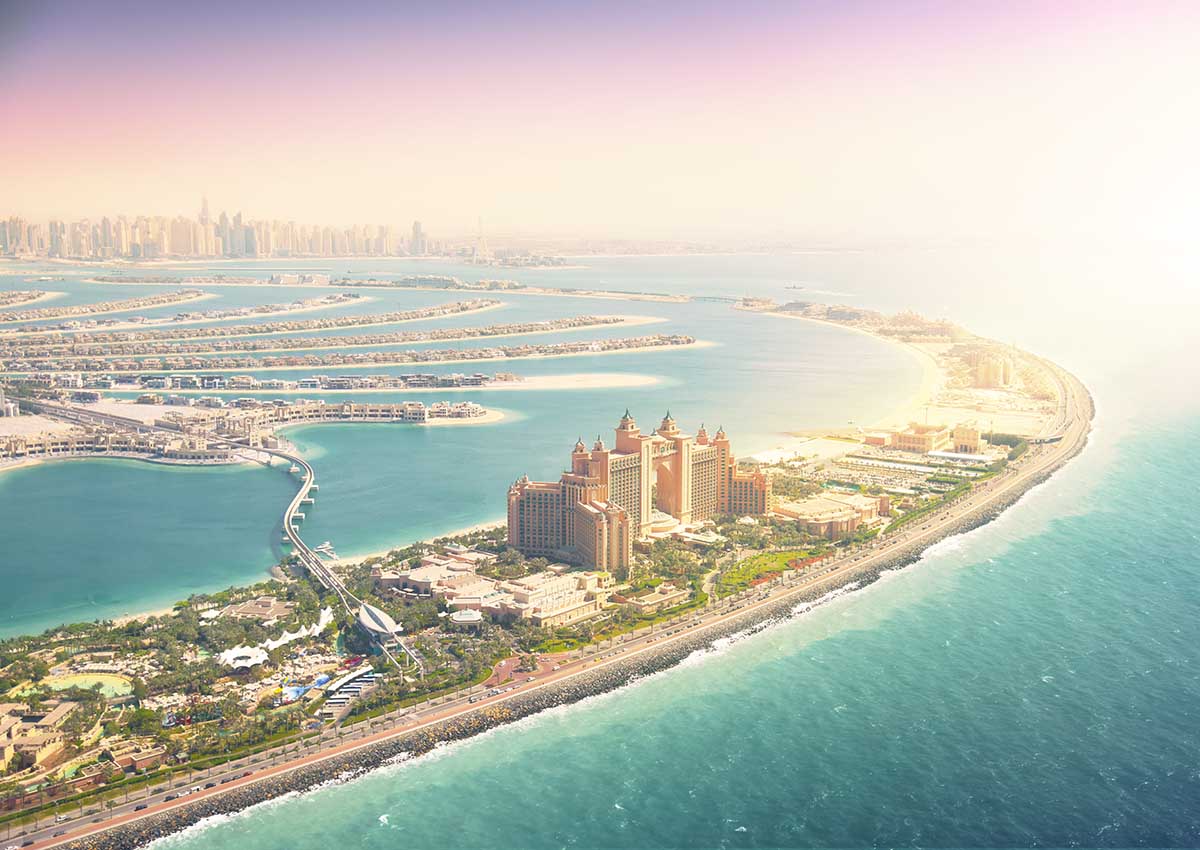How Much Does It Cost to Live in Dubai Per Month?
On average, you need $2,500 to $4,000 per month to live comfortably in Dubai as a single person, depending on lifestyle. For families, expect monthly costs of $4,500 to $8,000. Rent is the most significant expense, followed by schooling (if you have children), transportation, and groceries.
Now, let’s dive deep into what makes up these costs and how you can plan your monthly budget if you want to live in Dubai.
If you’re planning on moving to Dubai or buying property in Dubai, reach out to us. We will help you find the best property in Dubai. We will also provide you with Dubai Gold Visa guidance so that you’ll be able to live in Dubai long-term.
Why Understanding Dubai’s Cost of Living Matters.
Dubai is a global hub. It attracts professionals, entrepreneurs, students, and families from every corner of the world. The city blends modern luxury with Middle Eastern traditions, but that comes at a price. Understanding monthly living costs helps you decide whether Dubai fits your financial goals and lifestyle.
As someone who has lived in Dubai for 5+ years, I can tell you this: your expenses depend heavily on your choices. You can live modestly and spend less than $2,500 per month, or you can live lavishly and easily exceed $10,000 per month.
Let’s break down the cost of living in Dubai piece by piece.
1. Housing Costs in Dubai.
Housing is the single biggest monthly expense in Dubai. Rent prices vary based on location, type of property, and amenities.
- Studio apartments: $900 – $1,500 per month for average rent
- 1-bedroom apartments: $1,200 – $2,500 per month
- 2-bedroom apartments: $2,000 – $3,800 per month
- Villas (3–5 bedrooms): $3,500 – $8,000+ per month
Popular Areas in Dubai:
- Downtown Dubai / Business Bay: Premium apartments close to Burj Khalifa. High rent.
- Dubai Marina / JBR: Expat favorite with waterfront views, trendy vibe.
- Jumeirah / Al Wasl: Family-friendly villas with higher costs.
- Deira / Bur Dubai: More affordable, older areas with lower rents.
DRUS Pro Tip: Most landlords require you to pay rent quarterly or even annually in advance, although monthly options are becoming more common.
2. Utilities and Internet Cost in Dubai.
Utilities add another layer to your budget.
- Electricity, water, AC (DEWA bill): $150 – $300 per month (depending on apartment size and AC use).
- Internet and TV packages: $80 – $150 per month.
- Mobile phone plans: $40 – $100 per month (varies by data and provider).
Since Dubai is hot most of the year, air conditioning can make or break your DEWA bill.
3. Dubai Groceries and Food Costs.
Food expenses depend on whether you cook at home or eat out frequently.
- Monthly groceries for one person: $300 – $500.
- Family groceries (3–4 people): $700 – $1,000.
Local supermarkets like Carrefour, Union Coop, and Lulu offer affordable prices. Imported goods (cheese, organic produce, international brands) can double your grocery bill.
Eating Out:
- Casual meal at a café: $10 – $15.
- Mid-range restaurant for two: $50 – $80.
- Fine dining: $150 – $300+.
If you eat out daily, budget at least $600 – $900 per month per person.
4. Transportation Costs in Dubai.
Dubai offers multiple transportation options.
- Car ownership:
- Monthly loan repayment (if financing): $400 – $800.
- Petrol: $80 – $150 (fuel is cheap).
- Insurance: $100 – $200 monthly.
- Parking: $50 – $150.
- Public transport (metro, bus, tram):
- Monthly NOL card (unlimited pass): $80 – $120.
- Taxis: $5 minimum per ride, $15–$25 for cross-city trips.
DRUS Pro Tip: If you live near a metro line, public transport is affordable and reliable. But many expats prefer driving.
5. Dubai Healthcare Costs.
Dubai requires residents to have health insurance. Here is a breakdown of health insurance costs:
- Employer-provided plans: Often free for employees, may include dependents.
- Basic private health insurance for individuals: $150 – $300 per month.
- Comprehensive family coverage: $400 – $800 per month.
Out-of-pocket doctor visits cost $40 – $70 without insurance.
6. Education and School Fees in Dubai.
If you’re moving with kids, education will be your biggest expense after housing.
- Private schools: $500 – $2,000+ per month (per child).
- International schools: $10,000 – $25,000 annual tuition fee.
Nurseries and kindergartens range from $300 – $1,000 monthly per child.
7. Dubai Entertainment and Lifestyle Costs.
Dubai has no shortage of things to do, from luxury malls to desert adventures.
- Gym memberships: $60 – $150 per month.
- Cinema tickets: $12 – $20.
- Nightlife (clubs, bars): $10 per drink, $100+ for a night out.
- Weekend outings: $100 – $300 depending on activities.
Families may spend extra on theme parks, beach clubs, and kids’ activities.
8. Dubai Taxes and Savings.
One of Dubai’s biggest perks is the no personal income tax policy. That means your salary is yours to keep, minus small deductions for insurance or retirement contributions.
However, VAT (Value Added Tax) of 5% applies to most goods and services.
Monthly Budget Examples
Here are three sample budgets to give you a realistic picture.
Budget-Friendly Single Person’s Monthly Expenses (approx. $2,000/month).
- Rent (studio in Deira): $1,000
- Utilities + Internet: $200
- Groceries: $350
- Transport (metro + occasional taxi): $150
- Entertainment: $150
- Insurance: $100
- Miscellaneous: $100
Comfortable Expat Couple Monthly Living Expenses (approx. $4,500/month).
- Rent (1-bedroom in Marina): $2,200
- Utilities + Internet: $300
- Groceries: $600
- Transport (car + petrol): $400
- Entertainment/dining: $400
- Insurance: $200
- Miscellaneous: $400
Family with Two Kids Dubai Living Expenses (approx. $7,000–$8,000/month).
- Rent (3-bedroom villa in Jumeirah): $4,000
- Utilities + Internet: $400
- Groceries: $900
- Transport (2 cars + petrol): $700
- Education (2 kids in private school): $2,000
- Insurance: $400
- Entertainment & outings: $400
Dubai Cost of Living Compared to Other Cities.
- Dubai vs. New York: Rent is cheaper in Dubai, but groceries and imported goods are more expensive.
- Dubai vs. London: Education and healthcare can be costlier in Dubai, but income tax savings often balance it out.
- Dubai vs. Singapore: Both are pricey, but Dubai offers larger apartments for the same price.
Ways to Save Money in Dubai.
Living in Dubai doesn’t always have to be expensive. Here are strategies I personally used to lower costs:
- Live outside prime areas – Communities like Al Nahda or Silicon Oasis are cheaper.
- Cook at home – Imported restaurants add up quickly.
- Carpool or use the metro – Parking and fuel eat into your budget.
- Shop at local markets – Cheaper than international supermarkets.
- Use discount apps – Apps like The Entertainer cut restaurant and activity costs in half.
Cost of 30 Common Household Items in Dubai.
| Item | Average Price (USD) |
|---|---|
| 1. 1 liter of milk | $1.60 |
| 2. Loaf of bread | $1.50 |
| 3. 1 dozen eggs | $3.00 |
| 4. 1 kg rice | $2.20 |
| 5. 1 kg chicken breast | $6.80 |
| 6. 1 kg beef | $11.50 |
| 7. 1 kg apples | $2.70 |
| 8. 1 kg bananas | $1.80 |
| 9. 1 kg tomatoes | $2.10 |
| 10. 1 kg onions | $1.30 |
| 11. 1.5L bottled water | $0.60 |
| 12. 2L Coca-Cola/Pepsi | $1.90 |
| 13. Domestic beer (500ml) | $12.00 (in licensed shop) |
| 14. Mid-range bottle of wine | $20.00–$30.00 |
| 15. Basic lunch meal (café) | $10.00–$12.00 |
| 16. McDonald’s combo meal | $8.50 |
| 17. Mid-range dinner for two | $55.00–$75.00 |
| 18. Cappuccino (café) | $5.00 |
| 19. Public transport ticket (metro/bus) | $2.00 |
| 20. Monthly metro pass | $85.00–$120.00 |
| 21. Taxi start fare | $3.50 |
| 22. Petrol per liter | $0.90 |
| 23. Movie ticket | $12.00–$15.00 |
| 24. Gym membership (monthly) | $80.00–$120.00 |
| 25. Utility bill (electricity, water, AC for 85m² apartment) | $150.00–$250.00 |
| 26. Internet (monthly, 10–20 Mbps) | $90.00 |
| 27. Mobile prepaid plan (5GB data) | $20.00–$30.00 |
| 28. Pair of jeans (Levi’s equivalent) | $60.00–$90.00 |
| 29. Running shoes (Nike/Adidas) | $90.00–$120.00 |
| 30. Cinema popcorn & drink combo | $8.00–$10.00 |
Conclusion: Is Dubai Affordable?
Dubai can be as affordable or as expensive as you make it. Singles living modestly can get by on $2,000 a month. Couples seeking comfort should plan for $4,000–$5,000. Families with children in private schools will likely need $6,000–$8,000 monthly.
The city’s tax-free salaries often offset the higher cost of living, especially for professionals earning strong expat packages.
FAQ: Cost of Living in Dubai
1. Is Dubai an expensive city to live in?
Yes, Dubai is often considered an expensive city, but actual costs depend on lifestyle choices. Living in the city centre means higher monthly rent and residential costs, while moving slightly outside can lower expenses. Essentials like utility costs and transportation are manageable if you budget carefully.
2. What is the average monthly salary in Dubai?
The average monthly salary in Dubai varies by profession but is generally higher than in many regions to balance living expenses. Skilled professionals earn enough to cover monthly rent, utility costs, and daily needs, while still saving. Salaries are competitive, especially in major cities like Abu Dhabi and Dubai.
3. How much are rental costs for a one-bedroom apartment?
Rental costs for a one-bedroom apartment vary by location. In the city centre, the monthly rent can be high due to demand, while outside areas are more affordable. The average price depends on amenities and proximity to public transportation. Many single-person households find suburban areas more budget-friendly.
4. What are typical utility costs in Dubai?
Utilities cost in Dubai, including electricity, water, and cooling, can add a noticeable amount to monthly living expenses. For a single person in a one-bedroom apartment, expect moderate charges, though usage patterns affect the total. Overall residential costs increase with larger properties or family-sized flats.
5. How much does public transportation cost?
Public transportation in Dubai is reliable and affordable compared to car ownership. A monthly pass reduces bus costs and metro expenses significantly. Many residents rely on this system, especially those living outside the city centre. Public transit provides a budget-friendly way to cut living expenses while commuting daily.
6. What is the cost of living for a single person in Dubai?
For a single person, the cost of living depends on lifestyle choices. Monthly rent for a one-bedroom apartment, utilities costs, and food make up most living expenses. Public transportation, like a monthly pass, helps reduce commuting costs. Residential costs are generally higher in the city centre than in suburban areas.
7. How does the cost of living compare in major cities like Abu Dhabi and Dubai?
Both Abu Dhabi and Dubai are major cities with high residential costs. Rental costs, utilities, and property prices are similar, though Dubai is often considered a slightly more expensive city. Abu Dhabi offers competitive salaries and slightly lower living expenses in some neighborhoods, making both attractive options.
8. Are public and private schools expensive in Dubai?
Education in Dubai ranges from affordable public schools to higher-priced private schools. Many expats choose private schools for curriculum options, though fees add significantly to residential costs. Public schools remain an option for some families. Schooling, along with private health insurance, forms part of overall living expenses.
9. Do I need private health insurance in Dubai?
Yes, private health insurance or healthcare insurance is mandatory for residents. Employers often provide it, reducing personal expenses. Having insurance ensures access to quality healthcare and prevents high out-of-pocket costs. Factoring in premiums is important when calculating overall living expenses and residential costs in Dubai.
10. How high are property prices in Dubai?
Property prices in Dubai vary widely. City centre apartments are at a higher average price, while suburban areas are more affordable. Residential costs depend on location, size, and amenities. For investors, property prices are attractive compared to other major cities, especially when considering rental yields and demand.
11. What are typical living expenses in Dubai?
Living expenses include monthly rent, utilities cost, food, transportation, and insurance. A one-bedroom apartment outside the city centre is affordable for a single person, while the city centre has higher residential costs. Using public transportation and budgeting for private health insurance helps manage overall monthly spending.
12. How much do bus costs add to monthly expenses?
Bus costs are low compared to car ownership and fuel prices. Using a monthly pass, residents cut commuting expenses significantly. For a single person managing living expenses, public transportation is a smart choice. It reduces the overall residential costs, especially when living in more affordable areas outside the city centre.
13. What is the average price of a one-bedroom apartment in Abu Dhabi?
In Abu Dhabi, the average price of a one-bedroom apartment depends on location. City centre units command higher monthly rent, while suburban areas are more budget-friendly. Utilities cost, public transportation access, and proximity to schools all influence residential costs. Rental costs here are comparable to Dubai’s market.
14. Are utilities cost higher in major cities like Dubai?
Yes, utility costs can be higher in major cities like Dubai compared to smaller towns. Air conditioning, essential in the climate, drives up expenses. For a single person in a one-bedroom apartment, monthly bills are manageable but can rise in summer. Efficient use helps lower residential costs overall.
15. How do residential costs affect expats moving to Dubai?
Residential costs, including monthly rent, utilities cost, and property prices, are the largest expenses for expats. A one-bedroom apartment in the city centre has a higher monthly rent, while areas farther out have lower rental costs. Combined with healthcare insurance and transportation, these define the overall cost of living.


